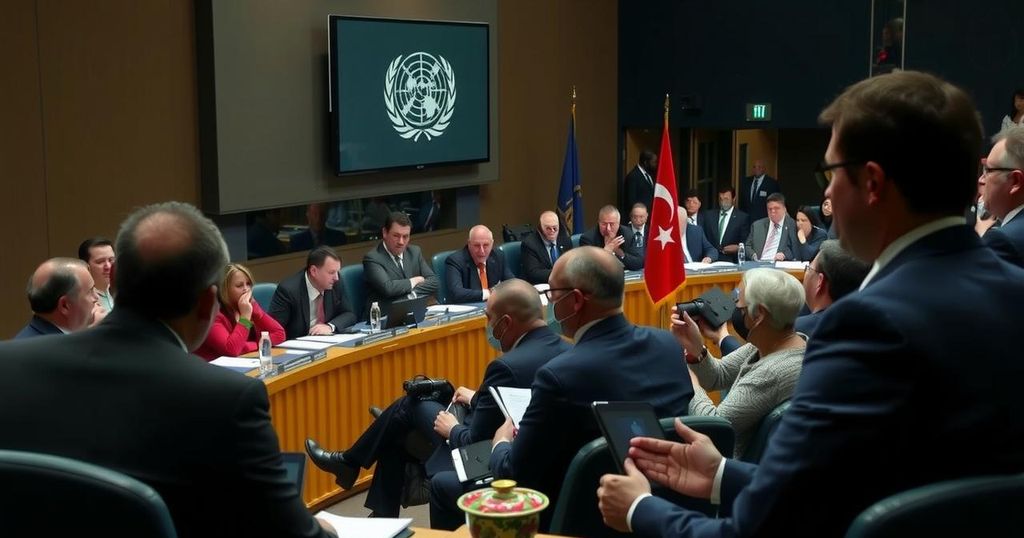Climate change
2023, ANTONIO GUTERRES, ASIA, AUSTRALIA, AZERBAIJAN, BAKU, CARLOS, CHRIS BOWEN, CLIMATE, CLIMATE CHANGE, COVID-19 PANDEMIC, CUBA, CURRENT EVENTS, EU, EUROPE, GERMANY, GOMEZ, JENNIFER MORGAN, JUAN CARLOS MONTERREY GOMEZ, LEON, LEONORE GEWESSLER, MU, MUKHTAR BABAYEV, NORTH AMERICA, OCEANIA, PANAMA, PETER DEJONG, PRIZES, SERGEI GRITS, UN, UNITED NATIONS, WO, WOPKE HOEKSTRA, YA, YALCHIN RAFIYEV
Isaac Bennett
0 Comments
Nations Express Discontent with Vague Climate Finance Draft at COP29 Summit
During the COP29 U.N. Climate Summit, countries overwhelmingly rejected a vague draft deal on financial commitments for climate assistance, citing the absence of a defined amount wealthy nations would provide to developing countries. The lack of substantial financial figures disappointed many, as negotiations aim to bridge a vast funding gap crucial for climate action.
At the COP29 U.N. Climate Summit in Baku, Azerbaijan, nations expressed widespread dissatisfaction with a vague draft agreement regarding financial assistance for developing countries to combat climate change. Key issues, particularly the lack of a specified financial commitment from wealthy nations, dismayed delegates. Notably, the draft included a placeholder “X” instead of actual funding numbers, raising alarms over the negotiation process. Nations are striving to bridge a significant gap between the estimated $1.3 trillion needed for climate financing and the anticipated contributions from affluent countries which amount to mere hundreds of billions.
Activists and environment ministers voiced the urgency of the matter, highlighting that the absence of clear commitments undermines the integrity of the talks. For instance, Colombia’s environment minister, Susana Mohamed, remarked, “We are negotiating on nothing,” emphasizing the importance of a tangible financial figure. Similarly, Juan Carlos Monterrey Gomez of Panama criticized the lack of transparency, calling it a “slap in the face to the most vulnerable” countries.
Frustration extended beyond finance; numerous nations indicated that the draft did not adequately address the global necessity to reduce fossil fuel use. The U.S. climate envoy stated there was a surprising absence of continuity from prior discussions aimed at reducing greenhouse gas emissions. Despite the overwhelming dissatisfaction, the COP29 Presidency has indicated that further revisions to the draft are expected, maintaining a dialogue for bridging the gaps identified by various stakeholders.
The ongoing climate negotiations at COP29 focus on finding financial solutions to support developing nations in their transition towards sustainable energy and adaptation to the effects of climate change. A central point of contention is the financial burden on wealthier nations, which has yet to manifest in concrete commitments. This year’s negotiations take place against the backdrop of escalating climate crises and heightened demands from vulnerable nations for significant cash flow to mitigate climatic impacts. The lack of clarity in financial offerings hinders progress and threatens the spirit of cooperative climate action established in previous agreements.
In conclusion, the COP29 climate talks in Baku reveal a complex interplay of frustration and urgency among nations as they grapple with insufficient financial commitments from wealthier countries to aid in climate initiatives. The vague draft proposal failed to address critical financial needs, prompting widespread criticism from delegates of developing nations. A clear path forward hinges on the readiness of affluent nations to present definite proposals that align with both the financial needs of vulnerable states and the urgent imperatives of global climate action.
Original Source: apnews.com




Post Comment